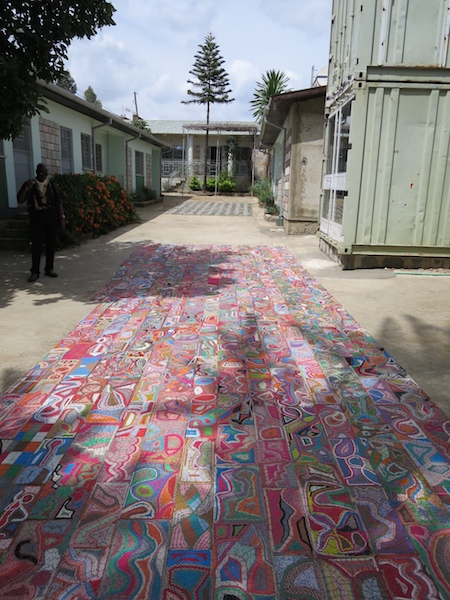Posted on May 28, 2014
From May 13–19, 2014, the Curatorial Intensive in Addis Ababa brought together a group of 11 curators to participate in seminars, site visits to local art spaces, studio visits with artists, and individual meetings with faculty.
Participating curators included: Philip Balimunsi (Kampala, Uganda), Helen Carey (Limerick, Ireland), Makeda Damtew (Addis Ababa, Ethiopia), Mohamed Hussein (Baghdad, Iraq), Mihret Kebede (Addis Ababa, Ethiopia), Wanja Kimani (Addis Ababa, Ethiopia / Nairobi, Kenya), Anna Kućma (Kampala, Uganda / Krakow, Poland), Georgina Maxim (Harare, Zimbabwe), Jillian Schultz (Los Angeles, CA, USA), Fitsum Tefera (Addis Ababa, Ethiopia), and Zoma Wallace (Washington DC, USA).
Over the course of the program, participants engaged in discussions with their fellow curators, as well as received feedback from the faculty advisors, in order to critically develop an exhibition or curatorial project idea. The Curatorial Intensive forged strong connections among these international colleagues, and initiated a dialogue for future collaborations and projects.
Meskerem Assegued, Director of Zoma Center for Contemporary Art (ZCAC), our local collaborator, hosted the Curatorial Intensive in the unique art space constructed by artist Elias Sime using traditional mud-house technique. This was the first time the Curatorial Intensive has been hosted inside an artwork! We also visited the artist, Elias Sime, whose work speaks about the importance of collaboration as a poetic reflection of societies. He generously laid out some new pieces for us to see at his studio.
Meskerem’s presentation focused on the importance of collaboration, international partnerships, and the need for independent thinking. It was articulated around a series of exhibitions she curated and art spaces she created in Addis since the late 1990s.
Konjit Seyoum, Director of Asni Gallery, walked us through the history of this pivotal independent space in Addis Ababa. She founded Asni with the desire to create a conceptually and economically independent space, open to all audiences in Ethiopia, which she certainly has managed to achieve. She made a strong case for the importance of experimental spaces, and her experience and vision inspired many new perspectives on the next generation of art spaces and curators.
Building on this knowledge of independent spaces, Jimmy Ogonga, spoke of the Center for Contemporary Art, East Africa (CCA Nairobi) which he co-founded. He also mapped the art scene of Nairobi from the 1960s to the present, highlighting the important role that artist collectives have played in the development of the scene there. And Elvira Dyangani Ose, Curator of International Art, Tate Modern, spoke of her practice as an independent curator, examining her past projects and drawing from a history of exhibitions of African Art that have been influential to her practice. She also spoke of her current work and focus at Tate Modern.
We heard perspectives from large art institutions in the continent too. Riason Naidoo spoke about the importance of going beyond formal criteria of evaluation when working with a collection, in order to construct rich and nuanced narratives. His talk sparked reflections on issues of representations and the construction of national history through art collections. He presented on the exhibition 1910–2010: From Pierneef to Gugulective at the National Gallery of South Africa in Cape Town, and the project The Indian in DRUM Magazine.
Since joining the National Gallery of Zimbabwe, Raphael Chikukwa has been doing extraordinary work, strengthening the institution and developing exhibitions of art from Zimbabwe for the local and international context. He spoke at length about the Zimbabwe Pavilions, which he curated for the Venice Biennale in 2011 and 2013, and plans for the future of the National Gallery.
On the final day of the program, the participants presented the proposals that they developed throughout the week and with feedback from many of the faculty. This took place at a public symposium hosted by the British Council in Addis Ababa. The final presentations were given in three panels, focused on the following themes:
1. Recovering Memory: archives and collections
2. Understanding Contexts and Creating Networks: international exchanges
3. Artistic Practice and Public Space
